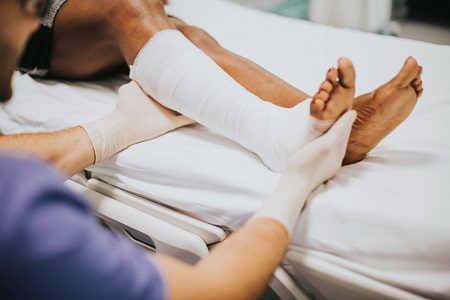A broken bone is a serious medical condition. It is painful, takes a long time to heal, limits a person’s movements during the healing period and if the bones are not set properly, can leave a person with permanent mobility issues. In the worst case, a broken bone could even lead to other medical complications that may become lethal. People associate fractures with injury caused by external forces, such as falling or being involved in a car accident and so on. What many do not realize is that a person can have medical issues that could cause brittle bones which will in turn make them more prone to breaking.
Hormones and Bones
Before looking at the way specific hormones affect bone strength, it is important to understand what hormones are. Hormones are chemical messengers that the body produces from different glands. These messengers move through the circulatory system and tissues, and control various metabolic processes vital to good health. Hormones work slowly over a long period of time and among the many processes they affect are growth and physical development, reproduction, sexual function, the way the body obtains energy from the food that is consumed and more. When the glands do not produce the correct amount of hormones, and this could be either too much or too little, diseases and ailments that affect various aspects of life can develop.
Among the various factors that can affect hormone production are aging, puberty, genetics, environmental factors, contracting certain diseases and taking various types of medication including herbal supplements, naturopathic medicines and prescription medications such as steroids and opioids. Lifestyle issues such as recreational drug use, smoking, excessive alcohol consumption, bad dietary habits and lack of exercise may all lead to hormone problems.
Also Read: எண்டோகிரைன் கோளாறுகள் – வகைகள், காரணங்கள், அறிகுறிகள், நோய் கண்டறிதல் மற்றும் சிகிச்சை வகைகள்
The Causes of Brittle Bones
Most people are aware of osteoporosis which is a condition in which the bones become porous and fragile. This is an affliction that normally affects the elderly, especially women. However, there are several hormone-related conditions that can make bones brittle and therefore more likely to suffer fractures. Among them are:
- Low Estrogen: This is a leading cause of brittle bones among women. It often develops during menopause. It may also appear in younger women who suffer from irregular periods or whose periods have stopped for a few months. Consumption of certain medications may also trigger low estrogen levels.
- High Cortisol: This is a hormone whose production is related to stress levels. Besides brittle bones, high cortisol levels may also result in unexplained weight gain, high blood pressure and the development of diabetes.
- Extra Parathyroid Hormone: This hormone is produced by the parathyroid gland located in the neck. High calcium levels are a common sign of this hormone imbalance.
- Thyroid Balance: Balanced hormone production by the thyroid gland is vital to weight control and maintaining energy levels. If the gland is overactive and produces too much of the hormone, brittle bones will result. If the thyroid gland is underactive, oral ingestion of thyroid hormone replacement to correct the imbalance may be prescribed. If the supplementary amounts of the hormone are too much, brittle bones will result.
- Vitamin D Deficiency: The importance of vitamin D in bone health is well-known. What is not known is that vitamin D is, in fact, a hormone. It is produced by the skin when exposed to sunlight. Insufficient levels of vitamin D are among the most widespread causes of brittle bones.
- Diabetes: People suffering from diabetes know that they need to pay special attention to the condition of their eyes, kidneys, heart and nervous system all of which may be affected by diabetes. What patients often do not realize is that high sugar levels in the body affect bone strength and increase brittleness which can lead to a greater risk of fractures.
Also Read: வைட்டமின் டி குறைபாட்டினை நிவர்த்தி செய்யும் வழிகள்
Hormonal imbalances that affect bone strength and other aspects of health are often easy to treat and cure. The earlier a problem is detected, the quicker and more effective the treatment and the recovery. If you are prone to sustaining fractures or have other signs of possible hormone problems, it is important to undergo an examination to determine whether there are any hormone-related problems and if so, what they are. Once this is done, treatment can begin. The best way to protect yourself against hormone-related brittle bone problems is to get examined and diagnosed at a leading multispecialty hospital which will have specialists from various medical disciplines who can, if required, work together to diagnose and treat the problem. And if the health issues are not hormone related, then treatment for whatever the cause of the problem is will be available at the same hospital.
One way of preventing hormone-related health issues is to undergo regular health check-ups so that any incipient health concern may be diagnosed early and treatment begun before the condition progresses to a more advanced stage.


